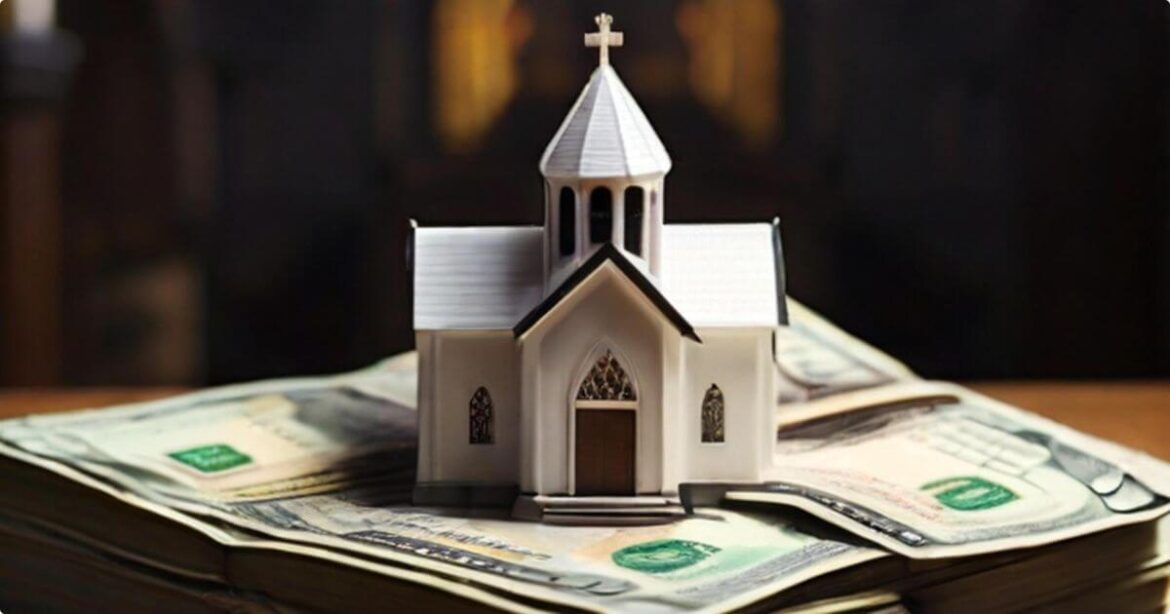Last Updated on December 29, 2025 by Amrita Das
Churches have long enjoyed the privilege of being exempt from paying property taxes in the United States. This exemption is rooted in the First Amendment guaranteeing freedom of religion and separation of church and state.
But why do churches not pay property taxes while other non-profit organizations are still required to do so? Are there any exceptions to this rule? In this article, we will take a closer look at whether churches are always exempt from paying property taxes and why this exemption exists.
Read More: Do Amish People Pay Taxes? Explore Step By Step

Characteristics Of A Legitimate Church
The concept of what constitutes a legitimate church can vary depending on individual beliefs and interpretations. However, for tax purposes, the Internal Revenue Service (IRS) has established guidelines to determine whether an organization qualifies as a church.
These guidelines include various characteristics that are commonly associated with traditional religious institutions.
One key characteristic of a legitimate church is having a distinct legal existence. This means that the organization must have its own separate legal identity and operate independently from any other entity or individual.
Additionally, the organization must have a recognized creed and form of worship, which refers to their specific set of beliefs and practices that guide their religious services.
Furthermore, a legitimate church must have a definite and distinct ecclesiastical government. This refers to the governing structure of the organization, which can vary depending on the specific religion or denomination.
Along with this, there should also be a formal code of doctrine and discipline in place to guide the actions and decisions of the church.
The religious history of an organization is also taken into consideration when determining its legitimacy as a church. This includes factors such as how long the organization has been in existence and its historical significance within a particular religion or denomination.
Additionally, membership is another important factor, as a legitimate church is typically made up of individuals who share the same religious beliefs and are not associated with any other church or denomination.
A key aspect of a legitimate church is having ordained ministers who lead and minister to their congregations. These ministers are expected to have completed prescribed studies and must meet certain criteria set by the organization.
The presence of established places of worship, regular congregations, and religious services also play a crucial role in defining a legitimate church.
Churches Tax-Exempt Status
Churches enjoy a special status in the eyes of the U.S. tax law that exempts them from paying federal, state, and local income and property taxes. This exemption is due to their classification as public charities under Section 501(c)(3) of the Internal Revenue Code.
As such, they are not required to pay these taxes even if they earn significant amounts of money.
This unique tax-exempt status allows churches to use their resources for the betterment of the community and further their religious mission without worrying about financial burdens that would otherwise be imposed by taxes.
However, this privilege comes with certain responsibilities and regulations that churches must adhere to in order to maintain their tax-exempt status.
Read More: Is HOA Tax Deductible? Complete Guide for Homeowners
Do Churches Pay Property Tax? A Step-By-Step Guide
The Law and Tax Exemptions for Churches
In the United States, churches are considered nonprofit organizations and are therefore eligible for tax exemptions on their properties. This means that they do not have to pay property taxes on assets such as buildings or land used for worship or other church-related activities.
However, this exemption is not automatically granted and certain criteria must be met in order for a church to qualify.
Factors that Determine Exemption Status
One of the main factors that determines a church’s eligibility for property tax exemption is the size of its congregation. A larger congregation may have a higher chance of being granted an exemption, as it can demonstrate a greater need for financial support.
Other factors that may be taken into consideration include the type of activities conducted on the property and whether or not the church provides services to the surrounding community.
Seeking Professional Advice
While federal tax laws provide guidelines for churches seeking tax exemptions, state and local laws may differ. It is important for churches to seek professional advice from individuals who are knowledgeable about these specific laws in order to ensure that they are taking advantage of all possible avenues for tax exemption.
This is especially crucial when considering other forms of tax relief such as welfare exemptions or benefits related to operating a school on church premises.
The Role of State Law
It is also important for churches to research the specific tax laws in their state. While federal law may provide certain guidelines, states have the authority to adjust property tax laws pertaining to churches and may offer additional forms of relief or exemptions that a church may not be aware of.
By understanding the tax laws at both a federal and state level, churches can make more informed decisions when it comes to managing their taxes and finances.
Overall, while churches do have the potential to save a significant amount on tax payments through property tax exemptions, it is important for them to thoroughly research and understand all relevant laws and regulations in order to maximize their benefits.
So, it can be said that churches do not have to pay property taxes, but the exemption is subject to certain conditions and requirements.
A Closer Look At Some Examples Of Property Tax Exemptions For Churches

Primary Place of Worship
Churches are considered sacred places and are typically exempt from property taxes on their primary place of worship. This includes the church building itself as well as the surrounding land.
As the main gathering place for religious services and activities, it is recognized that these properties play an integral role in fulfilling the spiritual needs of congregants.
The exemption for primary places of worship allows churches to allocate more funds toward their missions and community outreach programs.
Religious Activities
In addition to their primary place of worship, churches may also qualify for tax exemption on properties used primarily for religious activities. These can include prayer, worship, religious education, and community outreach programs.
By exempting these properties from taxes, churches are able to focus on their core function of serving the spiritual needs of their congregation without being burdened by additional financial obligations.
Personages and Clergy Residences
In certain states, there are exemptions in place for parsonages or clergy residences that are owned by churches. These residences serve as part of the compensation package for clergy members who reside in them.
This exemption recognizes the important role that these individuals play in carrying out the mission of the church and allows them to live on-site without incurring additional tax costs.
By providing this exemption, churches are able to attract and retain dedicated clergy members who can focus solely on their spiritual duties without financial strain.
Religious Schools
Churches may also qualify for property tax exemptions on properties used for religious schools, charitable activities, or other purposes that further the mission of the church. These exemptions allow churches to continue their important work in the community without being hindered by financial burdens.
Read More: Do Renters Pay Property Tax?
Renting Out Church Facilities And Tax Exemption
Churches typically have a tax-exempt status, but this can change depending on how they utilize their property. For instance, if the church starts earning income by renting out their facilities to external parties when not in use by the congregation, they may no longer be considered tax-exempt.
This is because the church is now engaging in commercial activities and generating profit from their property.
It’s important for churches to carefully consider how they use their property and ensure that any potential income-generating activities do not violate their tax-exempt status.
Additionally, the specific laws and regulations governing taxes for religious organizations vary based on location, so it’s crucial for churches to stay updated and comply with all relevant tax laws in their area.
The Motivation Behind Tax Exemptions For Churches
One of the main reasons why churches are often exempt from paying taxes is due to the motivation behind it. In some countries, this exemption is seen as a way to encourage organizations that do good and serve the community.
This is especially true in cases where churches provide various social services such as feeding the homeless or running shelters for those in need.
Another perspective on tax exemptions for churches is based on the principle of separation of church and state. This idea, which originated in the United States, states that the government should not interfere with religious matters.
As such, exempting churches from paying taxes is seen as a way to maintain this principle and ensure that government and religion remain separate entities.
Services Rendered vs. Benefits Received
Another factor that contributes to the tax exemption for churches is the fact that they do not receive many of the benefits typically provided by the government through taxes.
For example, churches do not benefit from public education or other services that are often funded through taxes. This leads many people to believe that it is fair for churches to be exempted from certain taxes since they do not directly benefit from these services.
Benefits for Members
While some may argue against tax exemptions for churches, there are benefits for members of these organizations. One major question that often arises is whether church donations are tax-deductible. The answer to this is yes, as churches are typically classified as non-profit organizations.
This means that members who donate money to their church can claim it as a deduction on their tax returns, which can ultimately benefit them financially.
Ensuring Compliance with Church Management Tools
To ensure compliance and make the process easier for both churches and their members, it is important to use user-friendly church management tools such as ChMeetings.
These tools not only allow for easy online payments and donation tracking but also provide automated reports and statements for tax purposes. This not only benefits members by simplifying the process but also helps churches maintain proper financial records and stay compliant with tax laws.
So, while some may question why churches are exempt from paying taxes, it is clear that there are valid reasons behind these exemptions that benefit both the organization and its members.
Getting The Tax Benefit – Steps For Churches
In order for a church to be eligible for property tax exemption, they must first apply for it. This may seem like an added step or burden, but it is necessary in order to receive the tax benefits.
It is important to note that this exemption is not automatic and varies by country and state. Therefore, it is crucial for churches to familiarize themselves with the guidelines and requirements specific to their location.
Some areas may require annual applications for the exemption, while others may have different time frames. Failure to properly apply or reapply for the exemption could result in losing out on valuable tax benefits.
Additionally, churches are also responsible for filing taxes in order to provide the government with necessary information. This is an important step in ensuring that churches are able to fully enjoy their tax benefits and maintain their status as property tax-exempt organizations.
Benefits Of Applying To The IRS For Churches
One major advantage is that by applying and receiving official recognition of their tax-exempt status, churches can provide assurance to donors that their contributions are indeed tax-deductible.
This can be especially important for larger donations where donors may want confirmation from the IRS before making a significant contribution. Furthermore, being listed as a qualified charitable organization in IRS records can also bring credibility and legitimacy to a church’s operations.
It shows potential donors and the general public that the church has met certain criteria and standards set by the IRS for tax-exempt organizations. This can help attract more donors and support for the church’s mission and activities.
Lastly, obtaining a determination letter from the IRS stating that contributions to the church are tax-deductible can be valuable in promoting fundraising efforts. This letter can serve as official proof of a church’s tax-exempt status, making it easier to communicate with potential donors and solicit donations.
It also provides transparency and accountability to donors, showing them that their contributions will be used for charitable purposes within the guidelines set by the IRS.
The Taxes Churches Pay: A Closer Look
As mentioned, churches do have certain tax responsibilities towards the societies they serve. One of the most common taxes that churches pay is payroll taxes.
This includes contributions to social security and Medicare for their employees, just like any other organization. In addition, clergy members also have to pay income taxes on their earnings.
While religious leaders may be exempt from some taxes, such as Social Security and Medicare if they opt out of these programs due to religious beliefs, they are still responsible for paying income tax on their salaries.
Moreover, churches may also be subject to tax on trading income and business activities not related to their central religious mission.
This means that if a church engages in any commercial activities, such as selling merchandise or renting out property, they may be required to pay income tax on the profits earned from these ventures.
Examples Of Situations Where Churches May Have To Pay Property Taxes

Commercial Ventures
Churches and other religious organizations may engage in commercial ventures or activities that are not primarily related to their religious purposes.
These ventures can include rental properties or commercial enterprises operated by the church, such as bookstores or event spaces. In these cases, churches may be subject to property taxes on these properties, as they are being used for non-religious purposes.
Size and Value Thresholds
In addition to engaging in commercial ventures, churches may also be subject to property taxes based on size and value thresholds set by states or local jurisdictions.
This means that if a church’s property falls above a certain size or value threshold, it may no longer be eligible for property tax exemptions and could be taxed.
It’s important for churches to closely monitor their property size and value and stay informed about any changes in the laws and regulations governing property taxation in their area.
Additional Reading: How To Pay No Taxes On Rental Income
Do Churches Pay Property Tax? Bottom Line
Therefore, churches are generally exempt from paying taxes in the United States, but this privilege is not absolute. They must meet specific criteria to qualify for tax-exempt status, and there are exceptions and limitations when it comes to income and property taxes.
Despite the controversy surrounding tax exemptions for churches, they continue to play an essential role in communities and provide numerous charitable and educational services.
It remains to be seen if any changes will be made to the current system, but for now, churches will continue to operate without imposing taxes or filing requirements.
So, it can be said that while churches may not pay taxes in the traditional sense, they still contribute greatly to society through their charitable work and are an integral part of our democracy’s freedom of religion.
